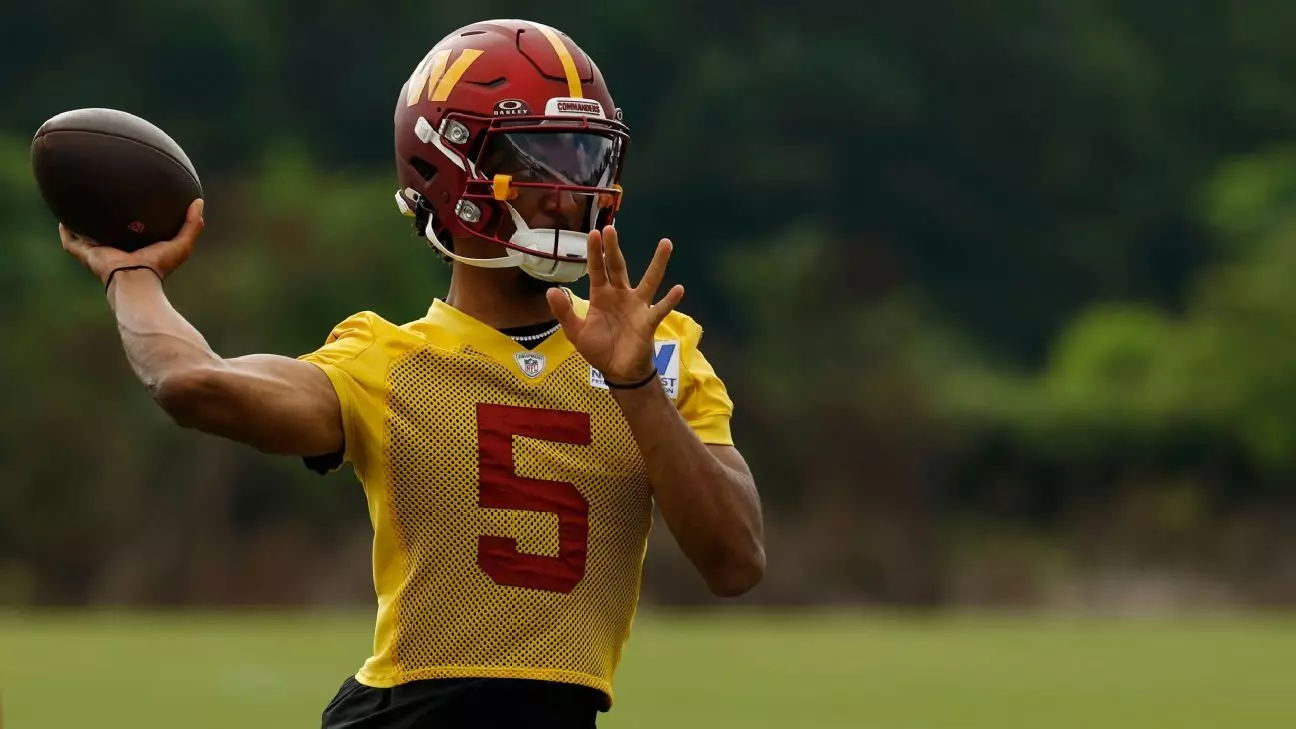In the high-stakes world of the NFL, quarterbacks are often judged not just by their stats but by their ability to evolve into leaders on and off the field. The recent development of Jayden Daniels with the Washington Commanders exemplifies a broader truth: experience and comfort in a system dramatically enhance a player’s impact, especially in a leadership role. What’s particularly compelling about Daniels’ growth is how he has transitioned from merely understanding his responsibilities to actively shaping team discipline and culture. His progression underscores an essential theme in player development—confidence breeds authority, which ultimately elevates team performance.
Initially, Daniels was seen as a promising rookie, capable of impressive statistical feats that garnered him Offensive Rookie of the Year honors. However, early in his career, he was still navigating the complexities of a new offense and the intimidating NFL environment. His focus was primarily on mastering the playbook, making quick decisions, and avoiding costly mistakes. Leadership wasn’t on his radar in those early days—the professional burden of guiding teammates was sidelined by the need to simply adapt and perform.
Gaining Mastery and Command: The Power of Experience
The critical turning point in Daniels’ trajectory appears to be the accumulation of time and familiarity with Kliff Kingsbury’s offensive system. Confidence has not only improved his execution but has elevated his influence within the team. The difference is palpable: Daniels no longer plays in fear of making errors but instead holds himself accountable for the team’s standards. His newfound assertiveness is evident in moments like halting a teammate from committing a penalty, immediately emphasizing discipline and professionalism. This shift from a passive participant to an active enforcer of team norms symbolizes a mental maturity that many players take years to develop.
One might argue that the maturation observed in Daniels is a testament to the importance of understanding one’s role deeply. When a quarterback is secure in their knowledge of the playbook and can process defensive looks swiftly, they become more than just a thrower—they become a team leader. It’s no coincidence that Daniels, who led his rookie class in offensive production, now exhibits qualities of a quarterback who anticipates and takes charge. His role has expanded from executing plays to shaping team culture, an evolution that many quarterbacks aspire to but few attain early in their careers.
Leadership as a Byproduct of Confidence and Responsibility
Daniels’ leadership rise, exemplified by actions like addressing false starts and setting standards during practice, highlights a vital truth: confidence must be paired with responsibility to truly impact a team. Veterans and coaches alike recognize this transformation. Coach Dan Quinn’s comments illuminate that Daniels’ second season wasn’t just an incremental improvement but a substantial leap, characterized by quicker processing and reduced deception by defenses.
What’s striking is Daniels’ own acknowledgment of this shift. He perceives himself as the ultimate standard-bearer for accountability. This internal shift from a player learning the ropes to someone instilling discipline is not just a marketing narrative but a real-world demonstration of an athlete maturing into their role. It sends a powerful message to younger players that leadership isn’t solely given—it is earned through consistent performance and taking responsibility for both individual and team success.
The Broader Implication: Experience as the Catalyst for Authentic Leadership
Looking beyond Daniels’ individual story, his growth offers a provocative lesson: in the NFL, technical mastery and mental clarity are prerequisites for genuine leadership. When players are comfortable with the scheme, their focus shifts from survival to influence—guiding teammates, setting standards, and creating a culture of accountability. This signals a promising future for Daniels, as his increased confidence suggests he is not merely a system quarterback but a potential franchise leader capable of driving the team toward sustained success.
The evolution from a talented rookie into a commanding team player is often understated or delayed. Yet Daniels’ case underscores that the second year, when a player’s familiarity with the system solidifies, can be transformative. As he continues to grow, his leadership qualities will likely become even more ingrained, shaping not only his personal development but also the identity of the Washington Commanders. His journey exemplifies how confidence—not raw talent alone—can unlock a quarterback’s true potential both as a player and as a pivotal figure in team dynamics.

